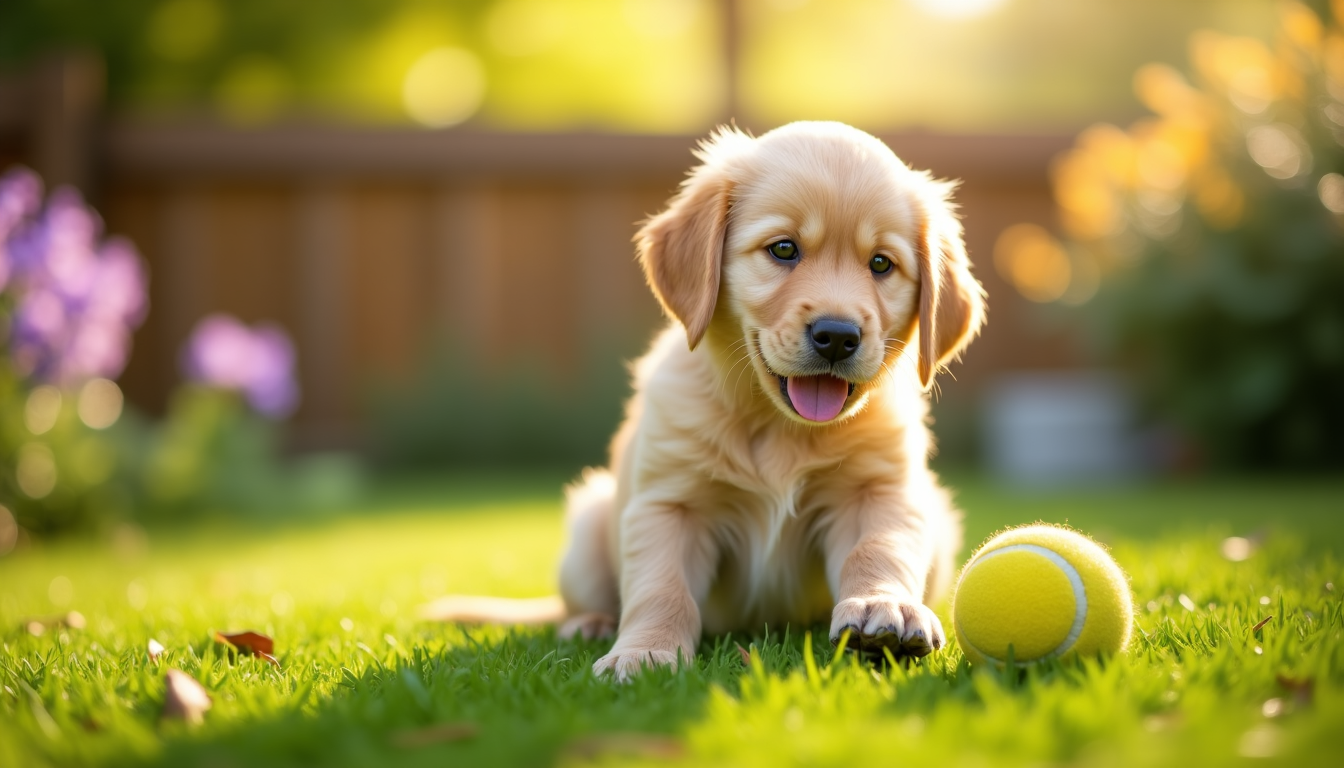Golden Retrievers remain one of America’s favorite dog breeds, yet their size might not work for everyone. Dog lovers looking for a smaller companion with similar lovable traits have found their answer in the mini Golden Retriever.
Our years of research and hands-on experience with various Golden Retriever types have taught us a lot. We know how confusing the world of mini Golden Retrievers can be. Future pet owners often ask about these dogs’ authenticity, traits, and care needs. This piece breaks down everything from breeding combinations to health issues. You’ll learn about finding good breeders and training requirements. The information here will help you decide if a mini Golden Retriever puppy should become part of your family.
Understanding Mini Golden Retrievers
People often ask us what sets a mini Golden Retriever apart from other designer dogs. The sort of thing I love about this breed is how it’s captured so many hearts since its development back in 2003.
What exactly is a mini Golden Retriever?
A mini Golden Retriever emerged as a thoughtfully created hybrid dog that keeps the beloved traits of standard Golden Retrievers in a smaller package. These dogs aren’t just smaller versions of purebred Golden Retrievers – they’re the result of careful breed mixing.
Common breeding combinations
Our work with these dogs shows most mini Goldens come from specific breed pairings. Breeders typically mix Golden Retrievers with Poodles or Cocker Spaniels. The Cocker Spaniel combination was popular at the time of original breeding programs, but breeders moved away from it because these dogs showed more snappish behavior.
Size and physical characteristics
Mini Golden Retrievers give families a more manageable option than their bigger relatives. Standard Golden Retrievers usually weigh 55 to 75 pounds and stand 20 to 24 inches tall. Their mini counterparts are lighter at 20 to 45 pounds and shorter at 14 to 20 inches at the shoulder.
These compact companions keep many classic Golden Retriever features:
- A dense, water-resistant outer coat with a soft undercoat
- Coat colors ranging from light cream to deep golden
- The same friendly expression and athletic build as their larger counterparts
Their looks can vary based on the breeds in their lineage, but they usually keep well-proportioned bodies and similar coat textures to standard Golden Retrievers. Their smaller size makes them great pets especially when you have apartment living situations or want a more manageable-sized companion.
More Read: The Black Golden Retrieve
Health Considerations and Genetic Testing

Our extensive work with mini Golden Retrievers has taught us that health testing plays a vital role in responsible breeding. Genetic screening makes a substantial difference in producing healthy puppies.
Required health screenings for parent breeds
Parent breeds need specific health screenings before breeding. The Golden Retriever Club of America lists several important tests.
- Hip and elbow certification (after 24 months of age)
- Annual eye examination by certified ophthalmologists
- Cardiac evaluation
- DNA testing for genetic variants
Common health issues to watch for
Our breeding program shows that mini Golden Retrievers can inherit health conditions from both parent breeds. PRA, hip dysplasia, and various heart conditions stand out as major concerns. Regular veterinary check-ups help detect these conditions early and manage them effectively.
Life expectancy and preventive care
Mini Golden Retrievers live longer than standard Goldens. Standard Golden Retrievers typically live 10-12 years. Mini Goldens can reach 14-17 years with proper care. Their smaller size reduces strain on joints and organs, which leads to this extended lifespan.
Dogs need to maintain a healthy weight because excess weight affects joint health. Research shows dogs neutered before one year grow taller and might live 1.1 to 2.2 years less. Regular flea and tick prevention could lower the risk of certain cancers.
Finding a Reputable Mini Golden Breeder

You need to think carefully when choosing the right breeder for your mini Golden Retriever. Our work with breeders of all types has given us a complete picture of what makes good breeders stand out from questionable ones.
Red flags to watch for
Several significant warning signs should make you pause before choosing a breeder:
- Refusing to show you the puppy’s parents or facility
- No health testing documentation available
- Keeping dogs in cramped or dirty conditions
- Using high-pressure sales tactics
- Unwillingness to answer detailed questions about their breeding program
Questions to ask potential breeders
The right questions will help you find a good breeder. You should ask about health screenings, socialization practices, and their breeding philosophy. Good breeders share health test documentation and genetic screening results readily. We suggest you ask about the breeder’s experience with mini Golden Retrievers and what support they offer after you take your puppy home.
Understanding pricing and costs
Mini Golden Retriever puppies cost between $1,500 and $5,000. The best puppies, particularly those with first pick rights, can reach $6,000. Quality breeders include several valuable items in their price:
- Health guarantees (typically 1-2 years)
- Initial vaccinations and health checks
- Starter supplies and documentation
Note that very low prices often signal poor breeding practices. Good breeders invest much in health testing and proper care. The purchase price represents just one part of what you’ll spend as an owner.
More Read: Red Golden Retriever
Training and Socialization Requirements
Our extensive work with mini Golden Retrievers has shown that early training and socialization build the foundation for well-adjusted companions. Here’s our proven approach to raising these intelligent dogs.
Early puppy development needs
The period between 3 to 14 weeks shapes a puppy’s development significantly. Our focus stays on exposing puppies to different experiences, sounds, surfaces, and social interactions. Starting with simple commands and house training right when your puppy comes home works best.
Common behavioral challenges
Mini Golden Retrievers can develop separation anxiety without proper early training. These dogs get their traits from both Golden Retrievers and Poodles, which makes them quick learners who want to please. But they might show some behavioral challenges:
- Excessive chewing when bored
- Jumping up on visitors
- Pulling on leash during walks
Recommended training approaches
Positive reinforcement methods line up perfectly with mini Goldens’ natural disposition. Short training sessions of 15-20 minutes each day work best. Our training programs show that consistent, structured approaches lead to great results.
Mini Golden Retrievers get their trainability from both parent breeds. Our Super Puppy Program helps with early socialization by introducing pups to different people and animals. The best results come from daily training sessions that build on old tricks while teaching new ones.
Note that each mini Golden learns at its own pace. We’ve seen that mixing patience with positive reinforcement creates the best training outcomes. Good training and socialization help these wonderful dogs grow into confident, well-mannered companions.
Conclusion
Mini Golden Retrievers give dog lovers all the Golden Retriever charm in a more compact size. Our research shows these delightful companions bring joy to families and need less space than their standard-sized relatives.
A reputable breeder who focuses on health testing and genetic screening sets the foundation for successful mini Golden ownership. This careful selection, plus proper training and early socialization, helps create well-adjusted, happy pets that can live up to 17 years.
Mini Goldens thrive with consistent positive reinforcement training and mental stimulation. Their intelligence and eagerness to please make them fantastic family dogs, though they need dedicated exercise time and companionship.
These special dogs show that great things can come in smaller packages. Properly bred and trained mini Golden Retrievers display all their standard-sized cousins’ beloved traits while fitting seamlessly into lifestyles of all types.
FAQs
Q1. What are the key characteristics of mini Golden Retrievers?
Mini Golden Retrievers are hybrid dogs that combine the beloved traits of standard Golden Retrievers in a more compact size. They typically weigh between 20 to 45 pounds and stand 14 to 20 inches tall, making them suitable for apartment living.
Q2. Are mini Golden Retrievers prone to health issues?
Like all breeds, mini Golden Retrievers can face certain health challenges. Common concerns include hip dysplasia, heart problems, and eye conditions such as Progressive Retinal Atrophy (PRA). However, with proper breeding practices, including comprehensive health screenings of parent dogs, many health risks can be minimized.
Q3. How long do mini Golden Retrievers typically live?
Mini Golden Retrievers often enjoy a longer lifespan compared to their standard-sized counterparts. While standard Golden Retrievers typically live 10-12 years, mini Goldens can live between 14-17 years with proper care.
Q4. What should I consider when looking for a mini Golden Retriever breeder?
When searching for a reputable mini Golden Retriever breeder, look for those who provide health testing documentation, allow you to see the puppy’s parents and living conditions, and are willing to answer detailed questions about their breeding program. Expect to pay between $1,500 and $5,000 for a well-bred mini Golden Retriever puppy.
Q5. What are the training and socialization needs of mini Golden Retrievers?
Mini Golden Retrievers are intelligent and eager to please, making them relatively easy to train. Early socialization and training are crucial, ideally starting between 3 to 14 weeks of age. They respond well to positive reinforcement methods, and short, consistent training sessions of 15-20 minutes per day are recommended.










